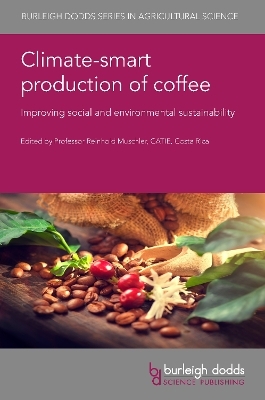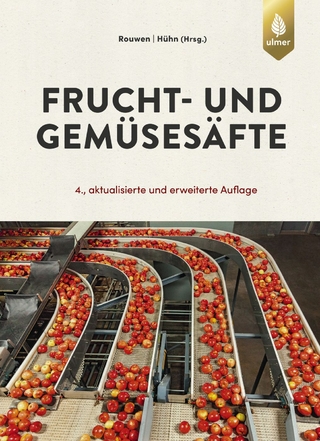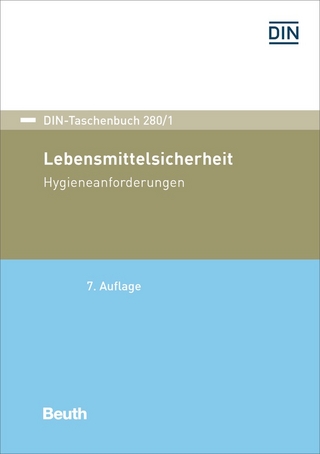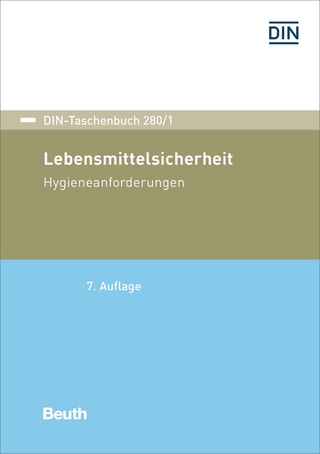
Climate-Smart Production of Coffee
Burleigh Dodds Science Publishing Limited (Verlag)
978-1-78676-483-6 (ISBN)
"This book would make a fine addition to the library of any extension agent, Q Processor Pro, and even conscientious green coffee buyers. It illustrates how to think about improving the social and environmental sustainability of coffee production: by thinking of and treating coffee production as a complex system of interrelated and interdependent parts." (Review by Michael Wright, Oil Slick Coffee Company LLC, USA)
“Speciality coffees emerged to satisfy a specific group of consumers, and such segmentation of the market continues today with refined gradations in quality and taste, along with a greater focus on social and environmental sustainability…the latter trend in coffee consumption also highlights the need for coffee growers to shift their production systems to a climate-friendly approach. Not only to meet the respective demand in the coffee market, but also to contribute to reducing the environmental impact of the coffee industry. How this can be done is outlined in this highly interesting and easy to read publication. Overall, this book that is based on extensive research by a wide range of internationally recognised experts, is of interest to all stakeholders in the coffee value chain, including extension workers and their organisations.” (Dr Eric Tielkes, Book Review in the Journal of Agriculture and Rural Development in the Tropics and Subtropics)
Coffee cultivation faces a number of crucial challenges, including increasing biotic and abiotic stresses related to climate change, concern about its environmental impact and the vulnerability of many smallholder coffee farmers.
Climate-smart production of coffee: Improving social and environmental sustainability addresses the need for more resilient and sustainable methods of cultivation which produce high-quality products with minimum environmental impact while still protecting smallholder livelihoods. The book considers ways of assessing and improving social sustainability, including the role of speciality coffees in improving smallholder incomes, as well as ways coffee production can be optimised throughout the value chain, from breeding through to postharvest.
Coffee is extremely susceptible to a range of pests and diseases such as soil-borne and other insect pests, nematodes and diseases such as coffee leaf rust. This new book reviews recent advances in sustainable crop protection methods on coffee farms and plantations around the world, with a particular focus on integrated pest and disease management programmes.
With contributions from a wide range of internationally-renowned experts, the book shows how coffee production can be made more economically, environmentally and socially sustainable in the face of climate change.
Professor Reinhold Muschler is the Latin American Chair in Agroecology and Agrobiodiversity at CATIE (the Center for Agricultural Research and Higher Education), Costa Rica. Professor Muschler has worked with leading international organizations such the FAO, World Bank and IFAD, and is internationally recognised for his research on improving tropical smallholder agroecosystems for crops such as coffee. Carlos Brando is a civil engineer who attended the SPURS and PhD programs at MIT. His long and diversified experience in the coffee sector has led him to work as a consultant for the International Coffee Organization, World Bank, Sustainable Trade Initiative, Global Coffee Platform, World Cocoa Foundation and many other companies and institutions. He has coordinated coffee projects in more than 50 producing countries across five continents, including all the main coffee growing areas of Brazil. Carlos has sat on the boards of UTZ and Ipanema Coffees, is a member of the Coffee Chamber of B3 (Brazilian Stock and Commodities Exchange), the Coffee Quality Institute’s Board of Trustees and MIT SPURS Advisory Board and chairman of the boards of the Global Coffee Platform and the Coffee and Immigration Museums in Brazil. In 2017 Carlos received a Lifetime Achievement Award from the African Fine Coffees Association. Dr Gabriele Regio is a tropical agronomist who is affiliated with the Oxfam Binational Programme in Haiti and the Dominican Republic. Hermann Alfred Jürgen Pohlan is a tropical agronomist and former Professor in Tropical Agriculture, University of Bonn, Germany. He is currently an International Consultant and has 50 years’ experience in more than 110 development projects in tropical developing countries in Africa, Asia, Latin America and the Caribbean. Professor Pohlan is the author or co-author of more than 80 peer-reviewed and 140 congress papers published in national and international journals, and author or editor of 18 books and 2 proceedings and 52 chapters in books. Ruud Bronkhorst is a retired rural development economist with experience with FAO, WFP, Dutch Ministry of Foreign Affairs, the Fair Trade sector and as a consultant. He currently works at Fair Price methodologies, esp. at fair prices for agricultural smallholders. Luis Fernando Aristizábal has more than 25 years experience working on different aspects of entomology, including a 12-year spell at the National Coffee Research Center in Colombia in which he focussed his research on coffee berry borer. Luis currently works as an Independent Consultant for an array of international organisations, including the United States Department of Agriculture (USDA).
Part 1 Improving social and environmental sustainability
1.Global coffee production and sustainability: Carlos H. J. Brando, P&A Marketing, Brazil;
2.The coffee sector and smallholder farmers: Gabriele Regio, Oxfam, Italy;
3.Assessing and managing the environmental and social impact of coffee production: H. A. Jürgen Pohlan and Marc J. J. Janssens, University of Bonn, Germany; and Dennis José Salazar Centeno, Universidad Nacional Agraria Managua, Nicaragua;
4.Specialty coffees as drivers of change: H. A. Jürgen Pohlan, University of Bonn, Germany; Dennis José Salazar Centeno, UNA Managua, Nicaragua; Juan Carlos Torrico-Albino, UMSA La Paz, Bolivia; and Marc J. J. Janssens, University of Bonn, Germany;
5.Fair-trade coffee: how fair is fair?: Ruud Bronkhorst, InfoBridge Foundation, The Netherlands;
6.Advances in Arabica coffee breeding: developing and selecting the right varieties: Álvaro Gaitán-Bustamante, Juan Carlos Arias-Suarez and Claudia Patricia Flórez-Ramos, Colombian National Coffee Research Center (CENICAFE), Colombia;
7.Optimizing post-harvest practices in coffee cultivation: Carlos H. J. Brando and João Alberto P. Brando, P&A Marketing, Brazil;
Part 2 Sustainable pest and disease management
8.Insect pests affecting coffee: understanding agroecosystems and alternative methods of control: Luis Fernando Aristizábal-Aristizábal, Independent Consultant, USA;
9.Diseases affecting coffee: an overview: S. Daivasikamani and A. P. Ranjini, Central Coffee Research Institute, India;
10.Ecological perspectives on the coffee leaf rust: Zachary Hajian-Forooshani and John Vandermeer, University of Michigan, USA;
11.Coffee wilt disease: Julie Flood, CABI, UK;
12.Integrated management of nematodes of coffee: Regina M. D. G. Carneiro and Marcilene F. A. dos Santos, Embrapa Recursos Genética e Biotecnologia, Brazil;
13.Integrated management of soil-borne insect and fungal pests of coffee : Cesar J. Fanton and Renan B. Queiroz, Instituto Capixaba de Pesquisa, Assistência Técnica e Extensão Rural (INCAPER), Brazil; and Laércio Zambolim, Universidade Federal de Viçosa, Brazil;
14.Integrated weed management in coffee production: Cláudio Pagotto Ronchi, Federal University of Viçosa, Brazil;
| Erscheinungsdatum | 10.08.2021 |
|---|---|
| Reihe/Serie | Burleigh Dodds Series in Agricultural Science ; 111 |
| Co-Autor | Dr Carlos H. J. Brando, Dr Gabriele Regio, Prof H. A. Jürgen Pohlan, Dr Marc J. J. Janssens |
| Zusatzinfo | Color tables, photos and figures |
| Verlagsort | Cambridge |
| Sprache | englisch |
| Maße | 152 x 229 mm |
| Gewicht | 810 g |
| Themenwelt | Technik ► Lebensmitteltechnologie |
| Weitere Fachgebiete ► Land- / Forstwirtschaft / Fischerei | |
| ISBN-10 | 1-78676-483-0 / 1786764830 |
| ISBN-13 | 978-1-78676-483-6 / 9781786764836 |
| Zustand | Neuware |
| Informationen gemäß Produktsicherheitsverordnung (GPSR) | |
| Haben Sie eine Frage zum Produkt? |
aus dem Bereich


